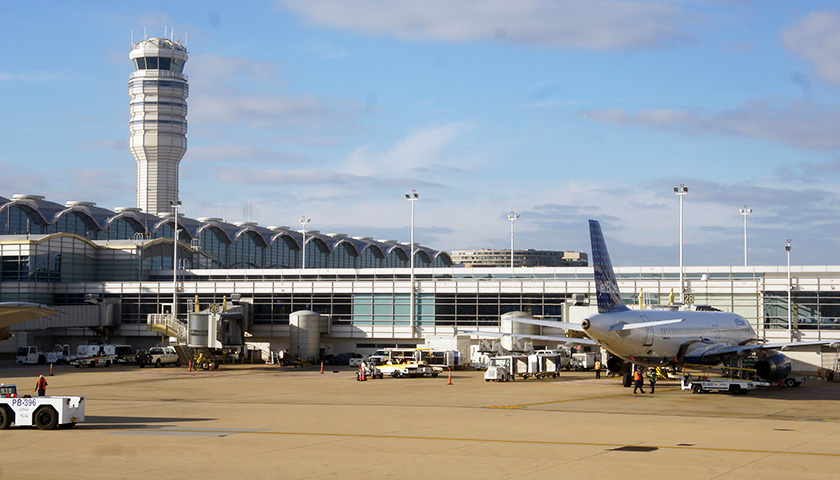by Sarah Roderick-Fitch
A recent poll shows a majority of northern Virginia residents support expanding the flight distance perimeter around Reagan National Airport, allowing the airport to accommodate more routes, thus making fares more competitive, according to supporters of the measure.
Recent legislation introduced by Utah congressmen Burgess Owens and Hank Johnson, known as The Direct Capital Access Act, part of the 2023 Federal Aviation Administration Reauthorization bill, would allow for the increase and creation of longer-haul flights in and out of Reagan. The legislation would add 28 flights in and out of the 1960s-era perimeter rule for incoming and outgoing flights.
The airport remains the only one in the nation with federal restrictions capping the number of flights with an outside radius of 1,250 miles – with a few exceptions.
The poll, conducted by a national research and analytic company, found nearly 57% of northern Virginia residents support a modernization of the perimeter rule. In comparison, only 22% believe it should remain the same. Interestingly, the survey found only 21% of residents were aware of the perimeter rule.
Affordability appears to be the most significant factor in support of modernizing the perimeter rule, 76% of respondents hope the change will lower airfares.
The Capital Access Alliance, a coalition of transportation and business leaders from Virginia and around the country who support the legislation, say the measure would make flights in and out of Reagan easier and more affordable.
The alliance conducted a recent study examining the utilization of the airport, especially in light of a recent $1 billion expansion resulting in a new terminal. The study says additional flights would boost competition, providing thousands more passengers with direct flights in and out, and boosting the economy by generating an economic value of up to $400 million. The study also projects that modernization would create more than 1,000 local jobs.
“When a federal regulation becomes so outdated that it unnecessarily hurts American consumers and arbitrarily burdens our nation’s economic growth, it’s time for Congress to act,” said Owens. “Modernizing the perimeter rule will improve access to Washington, D.C., reduce airline ticket prices, and increase tax revenue for the area.”
Critics of the perimeter reform, including Virginia Sens. Mark Warner and Tim Kaine, oppose the expansion, citing the recent addition of the Metro at Dulles, balancing air traffic between the Capital region’s three major airports and strain on airport facilities.
In a letter addressed to ranking members of the U.S. Senate Committee on Commerce, Science and Transportation, Kaine and Warner underscored the “stress” an expansion would have on Reagan and the surrounding area.
“These changes in flight activity have produced significant stress on DCA’s facilities, from strained roadways and limited parking availability to overburdened baggage systems, and created frustrations for travelers, businesses, and local residents,” the letter said.
Johnson and supporters of the legislation worry the limitations of flights hurt consumers by restricting competition.
“By limiting the number of flights in and out of National Airport, we are squeezing consumers – they are the ones paying the price,” said Johnson. “Travelers who want to visit capital region face the most expensive domestic ticket prices compared to other major markets because of limited competition. The DCA Act will help alleviate that pressure on consumers and flying public.”
Warner and Kaine argue the expansion of the Metro – specifically the new Silver Line extending to Dulles – encourages competition in air travel in the D.C. area. They say the current rules balance the three major airports in the region.
“With the expansion of Metro access to Dulles, long-distance flights from the Washington region have never been more accessible or competitive. The slot and perimeter rules help to balance consistent world-class aviation services at the region’s three major airports, which has in turn allowed for billions of dollars in private-sector capital investment in the metropolitan Washington area,” Warner and Kaine said in a statement.
“As Congress prepares to reauthorize the Federal Aviation Administration, we will strongly oppose any efforts to disrupt or undermine the balance between Dulles and [DCA], an airport one-fourteenth the size of Dulles,” the statement concluded.
Brian Walsh, a spokesman for the alliance, defended the legislation, saying the measure would give commonwealth consumers more affordable options.
“There are two great airports in northern Virginia, and travelers who prioritize flying into and out of DCA deserve affordable access,” said Walsh.
– – –
Sarah Roderick-Fitch is The Center Square’s Mid-Atlantic Regional Editor. She has previously worked as an editor, and has been a contributing writer for several publications.
Photo “Reagan National Airport” by Mariordo. CC BY-SA 4.0.









Rather fly into Reagen vs Dulles IF going to DC